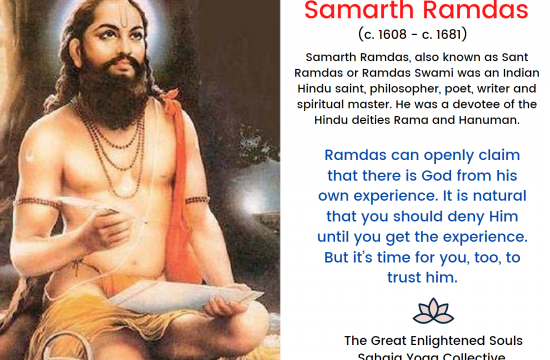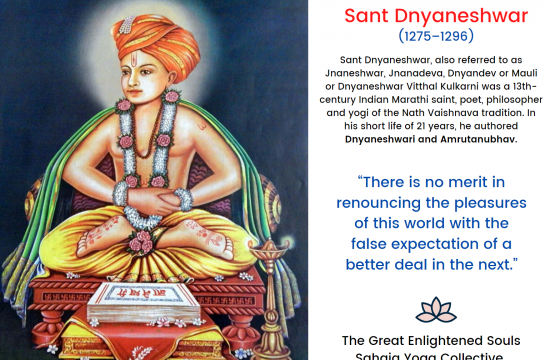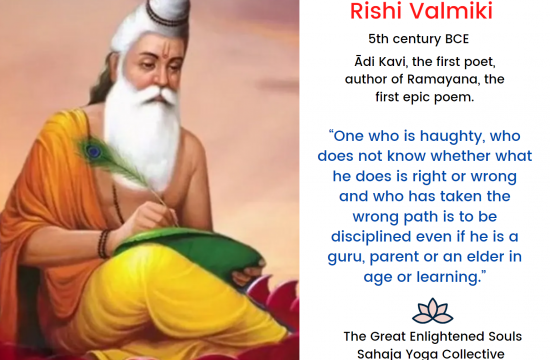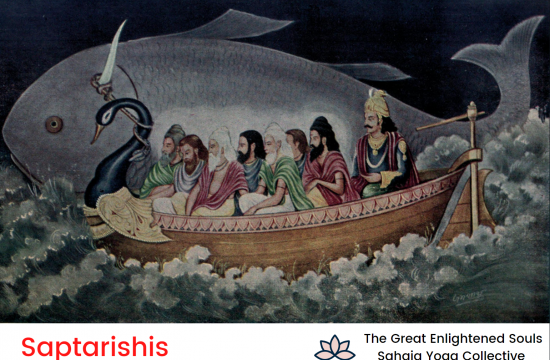NAMDEO (1270-1350) – Namdev, also transliterated as Nam Dayv, Namdeo, Namadeva, was an Indian poet and saint from Narsi, Hingoli, Maharashtra, India within the Varkari tradition of Hinduism. He lived as a devotee of Lord Vitthal of Pandharpur.
Namdeo was born in a family of tailors settled in Pandharpur. A robber-turned saint, he became a devotee of the Lord of Pandharpur at a sudden turn of events. One day he saw a widow beating her child who was wanting the sweetmeat offerings to God. Namdeo enquired why she was beating the child. The widow replied that she was a poor widow and her husband had been killed by cruel dacoits thus depriving her of any support. It suddenly dawned on Namdeo that he was that dacoit and became overcome with remorse.
Resolving to expiate his sins he tried to place his life at the feet of the deity by thrusting a sharp knife into his hand and pouring the blood on the deity. Suddenly, he heard a divine voice directing him to go to Pandharpur. He went there and as he stood gazing at the deity, he completely forgot himself. Completely absorbed in the Divine, he lost all body consciousness. It was the turning point of his life.
Namdeo next went to Aundhya Nagnath in search of his preceptor Visoba Kechar. When he entered the Shiva temple, to his surprise he found an old man lying with his feet on top of Shiva’s Pindi. Namdeo was very angry and reprimanded the old man to remove his feet. The preceptor said that he was too old and weak to lift his feet. He requested Namdeo to lift his feet and place them where there was no Pindi. Namdeo lifted his feet but wherever he turned to place them he saw the Pindi. Realizing the omnipresence of God, Namdeo prostrated before Visobha Kechar, who was none other than his preceptor.
Thus spoke the wise preceptor, “The ocean of samsara is vast. It is impossible to survive this ocean through your own
efforts. You must have a strong boat and the best sailor to take you across. Devotional songs in praise of the Lord are the strongest boat and Lord Vithoba your safest sailor.”
“O Namdeo, try to see the God who cannot be identified with name and is formless, present even in the minutest objects and occupying the whole universe and yet beyond it. The joy of your own self, is within you. Imbibe in yourself wisdom and detachment that will lead you to the attainment of formless, attributeless, Brahman, the God Almighty. You say that you have seen God but that is not correct. So long as the attachments of ‘I’ and ‘Mine’ are not severed, the self will not be realized.”
Namdeo meditated under the guidance of his preceptor and achieved God realization. He followed the practices of the seven fold chakras of the Nathayogis. These chakras are centres of energy which the force of the Kundalini open in her ascent from her seat at the base of the spine towards the top of the head.

These chakras are the Mooladhar Chakra, Swadishthan Chakra and Manipur (Nabhi Chakra). Above Manipur is the twelve petalled Anahata Chakra and yet upwards the sixteen-petalled Vishuddhi Chakra. Passing through the Agnya Chakra the Kundalini comes to the thousand-petalled Lotus Sahasrara, where Yogis receive full experience of Godhood. In this state divine identity is experienced in all the States of wakefulness, dream, sleep and the “Turiya.”
Namdeo combined this Yoga with Bhakti. He knew that ordinary people require a visible symbol for worship and hence stuck to his original worship of Vithal. Bhakti is the highest love of God; “Saguna or Nirguna” does not matter; it is the same to a devotee. The greatest impediment to concentration is the wavering mind. Without devotion, possession of all other virtues does not lead the devotee anywhere. God is not attained by mere verbal knowledge, but by direct experience.
His poetry is simple, yet rich in spiritual knowledge and devotion. He composed over two thousand poems in Marathi language and 337 in Hindi. They covered a wide spectrum of subjects besides devotion and social inequalities, like the life stories of Shri Krishna, Shri Rama, the praise of Shri Shiva, Shri Vithala, accounts of his pilgrimages, Yoga of meditation, etc. His works spread to Punjab and are to be found even in the Guru Granth Sahib.
He explained the futility of mastering the yogic postures and performing miracles. For instance, a poisonous snake may discard its skin and take a new one, but still cannot go to heaven.
Says Namdeo: “We shall sing and dance in divine intoxication and thereby light the lamps of spiritual knowledge
in the minds of men in this world.”
“You can know a saint by his indifference to worldly life, by his perennial love, his incessant remembrance of God’s name, his humanity, his constant divine contemplation, his effacement of egoism, his disregard of money, the absence of sensuousness and anger, his peace and forgiveness, his equality, his indifference of pleasure and pain and his eagerness to show men the path of devotion. Saints have great humane virtues as they feel all are men of god. At the highest, the saints thought about other saints is that they are all god incarnate and God lives in them.”
“So long as gross desires, anger and attachments are in the mind, what is the use of living in the forest by renouncing
worldly life?”
In one of his poems he says that the priests were unhappy with Shri Vithala because he lovingly fed a low caste like Namdeo and they told Shri Vithala to get purified by having the bath in Holy River and distributing gifts and money to the priests.
In another poem, he puns on the hollowness of so called intellectuals “when I approached a Scholar of Vedas, though expert in ritualism, he could not satisfy my quest, because in him, the ego dominated. Then I went to a person, who was supposed to be the learned one in scriptures to know the self. He was found arguing with others like him and they did not agree with each other even on one point, due to the illusory spell of their egos. Those who were singing the praise and the glory of God were mainly interested in materialistic gains. O God! All these could not satisfy my quest. I am now tired of running around and hence surrendered to you.”
In yet another poem, he rebuked those who make money through discourses on God’s glory – they should not even be looked at.
What is the use of becoming a religious preacher or a recluse, external appearances have nothing to do with
spirituality. The source of joy is within. As long as there is no change in the mind, what can external changes do?
Author Yogi Mahajan – ‘Realized Saints’








